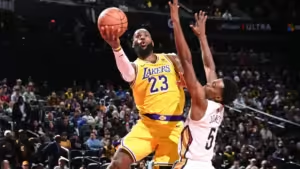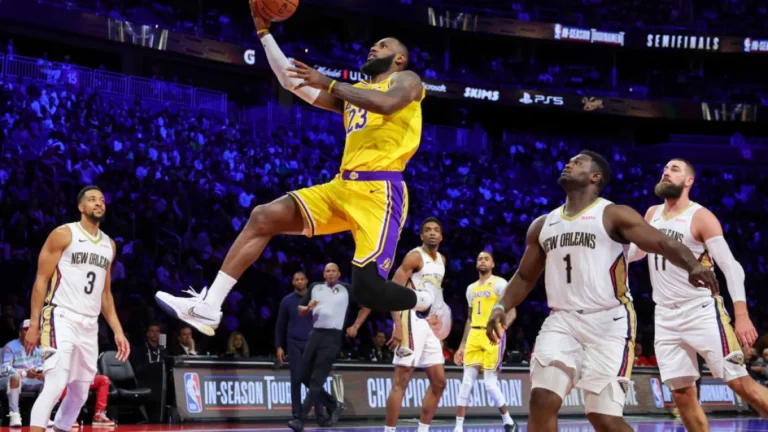Introduction to the Matchup
The impending match between the New Orleans Pelicans and the Los Angeles Lakers is anticipated to be a significant clash, highlighting the competitive spirit and historical rivalry between these two teams. Both franchises have shown considerable evolution over recent years, with their respective standings in the league reflecting a narrative of growth and ambition. Understanding the nuances of their current performances can give fans a clearer perspective on what to expect in their upcoming face-off.
As of the latest standings, the Pelicans have demonstrated a commendable resilience, striving to secure a playoff position while the Lakers continue to navigate through their own ups and downs in the league. The stakes of this matchup extend beyond just the current season; both teams are vying not only for a win but also for a strategic advantage heading towards the playoffs. With star players on each side contributing significantly to their teams, analyzing the New Orleans Pelicans vs Lakers match player stats could furnish insights into potential outcomes and player performances that could influence the final score.
Recent games have seen both teams exhibit distinct playing styles and strategies. For instance, the Pelicans’ young core has been a revelation this season, displaying energy and a willingness to adapt under pressure, whereas the Lakers continue to rely on their seasoned veterans to guide them through challenging situations. This matchup not only represents a clash of talent but also a showdown that could redefine playoff trajectories for both teams. Evaluating the player statistics from their previous encounters will be invaluable in understanding the dynamics at play and the pivotal roles individual players may have in shaping the match’s outcome.
Key Player Statistics Breakdown
The recent encounter between the New Orleans Pelicans and the Los Angeles Lakers provided a comprehensive showcase of each player’s capabilities and highlighted their contributions on the court. Examining the New Orleans Pelicans vs Lakers match player stats, it becomes evident that individual performances played a critical role in determining the outcome. This analysis will dissect key statistics including points scored, rebounds, assists, steals, blocks, and shooting percentages for notable players from both teams.
For the Pelicans, Zion Williamson demonstrated his scoring prowess, contributing significantly to the team’s offensive efforts with 28 points. His efficiency was reflected in a shooting percentage of 58%, surpassing his season average, which emphasizes his prowess in attacking the basket. Williamson also contributed six rebounds and four assists, showcasing his versatility on the court.
On the other hand, Brandon Ingram provided a solid performance, contributing 22 points and seven rebounds. While his shooting efficiency dipped slightly below his norms, his ability to create shots for himself and others still stood out, making him a key player in this rivalry. Additionally, Ingram’s defensive stats, including two steals, reflect his commitment to securing possessions.
For the Lakers, LeBron James continued to display why he remains one of the league’s premier players. He finished the match with 30 points, 10 rebounds, and eight assists, nearly achieving a triple-double. LeBron’s shooting was impressive at a rate of 62%, underscoring his ability to perform under pressure. Anthony Davis also had a noteworthy game, accumulating 24 points, eight rebounds, and three blocks, asserting his dominance in the paint.
Examining the New Orleans Pelicans vs Lakers match player stats offers valuable insights into their performances, revealing standout attributes and areas requiring improvement. While some players exceeded expectations, others struggled to maintain their season averages, illustrating the fluctuating nature of sports performances. This analysis sets the groundwork for understanding the ongoing developments of both teams and their key players.
Impactful Moments of the Game
The match between the New Orleans Pelicans and the Los Angeles Lakers was filled with pivotal moments that significantly influenced the player stats and ultimately the game’s outcome. From the opening tip-off, both teams displayed an aggressive approach, setting the stage for a competitive contest. One of the most notable turning points occurred in the second quarter when Pelicans forward Zion Williamson executed a spectacular alley-oop dunk, igniting the home crowd and boosting his team’s momentum. This play not only showcased Williamson’s athleticism but also highlighted the synergy between him and point guard CJ McCollum, leading to elevated statistics for both players throughout the match.

As the third quarter unfolded, the Lakers responded strategically, making adjustments that allowed LeBron James to dominate the perimeter. His ability to create opportunities for teammates became evident, resulting in a surge of assists that contributed to the overall player stats for the Lakers. Despite the Pelicans maintaining a slight lead, James’ sharpshooting and court vision shifted the dynamic of the game, demonstrating how individual talent can impact collective team performance.
The final quarter intensified as the lead changed hands multiple times. A key defensive play by Pelicans center Jaxson Hayes disrupted a Lakers fast break, leading to a crucial three-pointer by Brandon Ingram. This moment not only brought the Pelicans back into contention but also emphasized how vital defensive plays contribute to offensive opportunities, thereby affecting individual player statistics. The back-and-forth nature of the game, marked by critical plays and heightened player performances, exemplified the intertwining relationship between impactful moments and player stats in the New Orleans Pelicans vs Lakers match.
Conclusion and Implications for Future Games
As we analyze the New Orleans Pelicans vs Lakers match player stats, it becomes evident that individual performances not only influence the outcome of a single game but also have broader implications for the teams moving forward. The statistical outputs from this matchup provide insight into specific players’ strengths and weaknesses, shaping the strategies that each coaching staff may adopt in future contests.
The Pelicans showcased several promising talents, with standout players making significant contributions on both ends of the court. Their ability to score efficiently while maintaining defensive rigor signals their potential to compete effectively in upcoming games. The implications of these performance metrics suggest that the Pelicans may focus on enhancing their ball movement and maintaining a solid defensive stance to capitalize on the strengths observed in this matchup.
On the other hand, the Lakers, despite any challenges faced during the game, continued to demonstrate their depth and experience. The player statistics indicate areas where improvements can be made, particularly in rebounding and transition defense. A review of the match reveals that for the Lakers to regain their competitive edge, they may need to adjust their game plan, emphasizing player rotations and defensive accountability.
Considering both teams’ recent forms as reflected in their player stats, fans can anticipate an excitement-filled season ahead. The observations drawn from the New Orleans Pelicans vs Lakers match player stats serve as a critical barometer for what lies ahead in the NBA. With adjusted strategies and individual performances analyzed, each team’s journey through the remainder of the season appears promising, hinting at fierce rivalry and compelling matchups that will capture audiences nationwide.
May Be You Also Read

